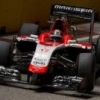Well they raced identical machinery in F3 several years ago. Same car, same engine, same tires, same time.
Hamilton won 15 races, took 13 poles and 10 fastest laps. Vettel didn't win a race, never took pole but managed one fastest lap.
Yes, out of context it looks like Hamilton slaughtered Vettel in circumstances that were very equal. But when the ignorance of that post is shed off and the info about how this was Vettel's first season in the series while it was Hamilton's second is considered, the picture changes completely, especially when one is told about how Hamilton, in his first year in that particular series won only one race while the 'not so super-talented' Jamie Green slaughtered him, in equal machinery (i.e with the same car, same engine, same tires and of course at the same time), to win seven races on his way to that year's title.
My question is, why did we see such a big performance difference between the first and second years of Hamilton's time in that series? Such a difference (not as dramatic though) can be seen in Vettel's time there too. Is experience such an important factor in junior series? If so, why is it? And what about f1?
Discuss...
PS: And please, lets just keep it to ''the importance of 'EXPERIENCE' in junior series and f1''. Not everything - like the 'World Suzuki Liana Championship' - has to turn into a 'my driver is better than yours' argument. If anyone wants to proclaim Jamie Green to be the fastest driver on the grid - wait a minute, he's not even on the grid - then this is not the place.
Edited by gillesthegenius, 16 February 2013 - 07:39.




























